Pain in upper back after sleeping can be a frustrating and discomforting experience. It not only affects the quality of your sleep but can also impact your overall well-being. In this article, we’ll discuss the common causes of back pain (upper & lower) after sleeping, practical strategies for prevention and lastly will provide you knowledge on effective methods for its relief.
Table of Contents
Common Causes of Pain in Upper Back after Sleeping:
A. Incorrect Sleep Posture:
The way you position your body during sleep plays a pivotal role in whether you will have pain in upper back after sleeping or not. Incorrect sleep posture can strain muscles, compress nerves, and misalign the spine, leading to discomfort and pain. Let’s take a closer look at different sleep positions and their effects on your back:
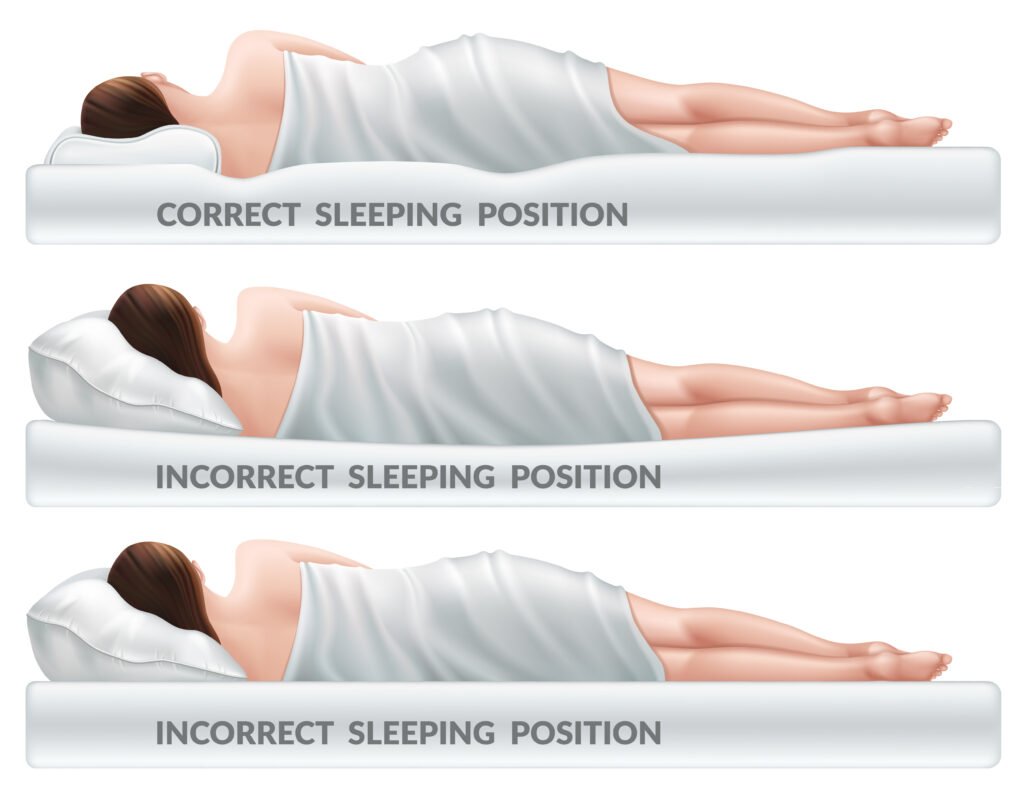
Tips for Correct Sleep Posture to improve pain in upper back after sleeping:
- Back Sleepers: Place a pillow under your knees to maintain natural spinal alignment.
- Side Sleepers: Use a firm pillow to support your neck and place another pillow between your knees.
- Stomach Sleepers: This position is generally not recommended, but if you must, use a thin pillow under your pelvis.
B. Mattress and Pillow Issues:
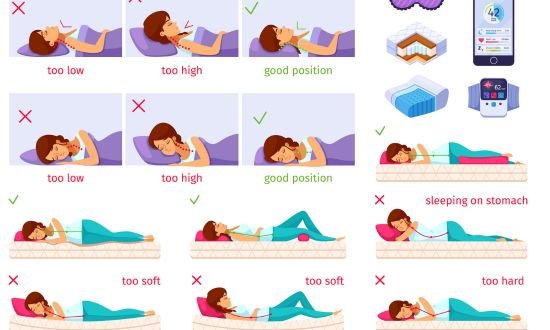
An old, worn-out mattress or the wrong pillow can contribute to pain in upper back after sleeping. A supportive mattress and the right pillow are essential for a good night’s sleep and spinal alignment. Do follow https://www.gramercypaincenter.com/upper-back-pain-after-sleeping-how-to-fix/ for visual illustration of how mattress issues cause upper back pain after sleeping.
C. Stress and Tension:
Stress and tension can manifest physically, leading to upper back pain after sleeping. Practice stress-reduction techniques such as meditation, deep breathing, or yoga is helpful in easing your mind and body.
D. Medical Causes of Upper and Lower Back Pain:
1. Herniated Disc:
A herniated disc occurs when the cushion-like discs between your vertebrae bulge or rupture. This can lead to intense back pain, often radiating down the legs.
2. Sciatica:
Sciatica is characterized by pain radiating from the lower back down the leg, often due to pressure on the sciatic nerve.
3. Arthritis:
Various forms of arthritis, such as osteoarthritis and rheumatoid arthritis, can affect the spine, causing chronic back pain.
4. Physical Injury:
Accidents, falls, or even strenuous activities can result in physical injuries to the back, leading to acute back pain.
5. Pregnancy-Related Back Pain:
Pregnancy can place extra stress on the back causing back pain due to the growing belly’s weight and hormonal changes.
- Relief Strategies for Pregnant Individuals:
- Prenatal yoga or swimming.
- Supportive maternity pillows.
- Consultation with a healthcare provider for safe pain relief options.
6. Myofascial Pain Syndrome and Fibromyalgia:
These chronic pain conditions can cause widespread muscle pain, including in the back.
Prevention Strategies for pain in upper back after Sleeping:
You can significantly reduce the risk of developing pain in upper back after sleeping by adopting these preventive measures into your daily life. Remember that opting a healthy life style and following it consistently will play an important role in maintaining sound back health. Prevention strategies include:
- Doing Regular Exercise
- Focusing on Good Posture
- When lifting objects, bend your knees and use your legs, not your back, to lift.
- Using supportive footwear
- Maintaining a healthy sleep environment
- Staying hydrated as dehydration can cause muscle cramps and stiffness, which can contribute to back pain.
- Managing stress as chronic stress can lead to muscle tension and back pain.
- Avoid prolonged periods of inactivity, which can contribute to muscle stiffness and weaken the muscles supporting your spine.
- Quit Smoking assmoking can reduce blood flow to the spine which disturbs the body’s ability to repair tissues, increasing the risk of back pain.
- Maintaining a healthy weight
Management Of Back pain after Sleeping:
A. Exercises and Stretches for back pain:
Exercises and stretches helps in strengthening the muscles that support your spine which improves its flexibility and helps in better posture. This can help in improving pain in upper back after sleeping. Here are some effective exercises and stretches that can be done to improve back pain:

Strengthening Exercises:

- Planks: Planks are excellent for strengthening your core, which plays a crucial role in supporting your spine. Start with a forearm plank, holding the position for 30 seconds to a minute, and gradually increase the duration as you build strength.
- Bridges: Bridges are good for your lower back and glute muscles. Bridges can be done by lying on your back with your knees bent and feet flat on the floor. Form a straight line from your shoulders to knees by lifting your hips from the ground. Stay in this position for few seconds and then relax. Repeat this exercise for 10-15 repetitions.
- Supermans: This exercise targets the muscles in your lower back. Extend your arms in front of you by lying face down. You have to squeeze your lower back muscles by simultaneously lifting your legs, arms and chest from the ground. Hold for a few seconds and lower back down. Do 10-15 repetitions.
- Bird Dogs: Start withyour hands and knees in a tabletop position. Extend your right arm and left leg simultaneously while keeping your core engaged. Remain in this position for a few seconds and then change sides. Perform 10-15 repetitions on each side.
Stretching Exercises for back pain:
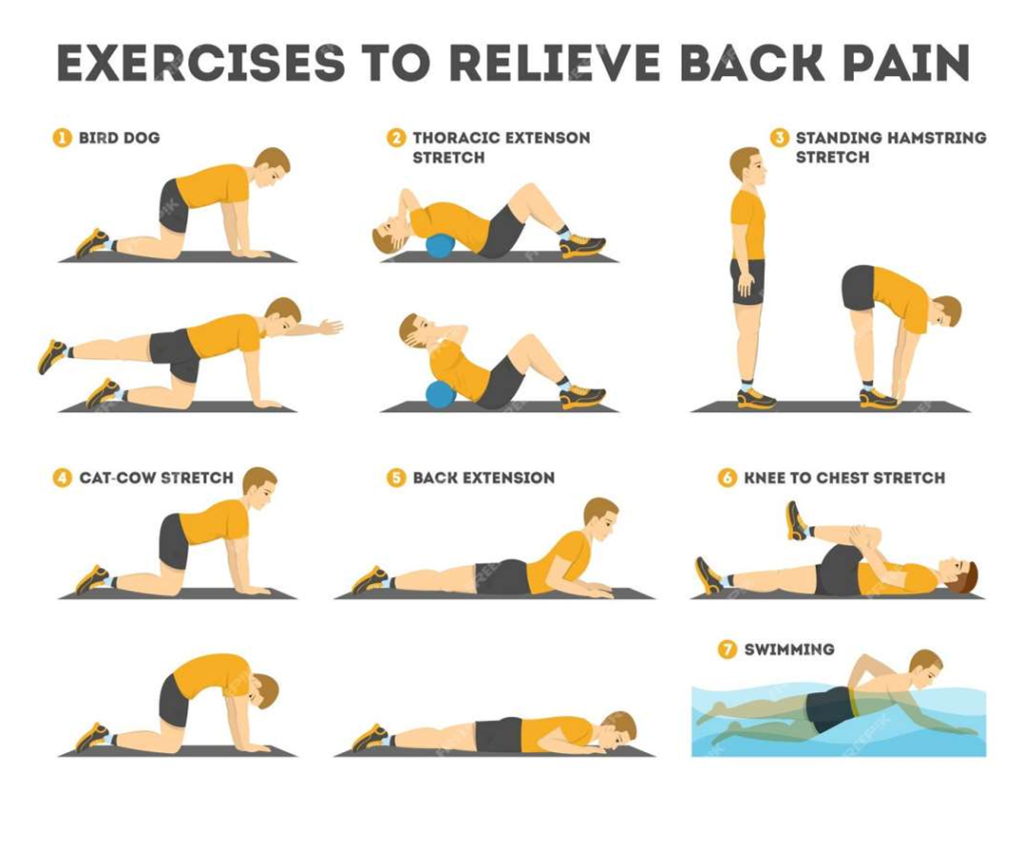
- Cat-Cow Stretch: This yoga-inspired stretch helps improve spinal flexibility. Make a tabletop position starting with your hands and knees. Inhale as you arch your back and lift your head (cow position), and exhale as you round your back and tuck your chin (cat position). Repeat this motion for 10-15 rounds.
- Child’s Pose: From a kneeling position, sit back on your heels and extend your arms forward on the floor. It will help in relaxing the tension in lower back.
- Hamstring Stretch: Hamstrings tension can cause lower back pain. Sit on the floor with one leg extended straight and the other leg bent so the sole of your foot is against the inner thigh of your extended leg. Try to touch your toes by keeping your back straight. Do this stretch for 20-30 seconds on each leg.
- Piriformis Stretch: The piriformis muscle can cause sciatica-like pain when tight. Bend your both knees by lying on your back. Cross one ankle over the opposite knee and then gently pull the uncrossed leg toward your chest. Do this stretch for 20-30 seconds on each leg.
Yoga and Tai Chi:
Practicing yoga or Tai Chi regularly can improve flexibility, balance, and posture. These disciplines often include a variety of stretches and poses that can benefit your back and overall well-being. By following these techniques you can get rid of pain in upper back after sleeping.
B. Life Style Modifications and Relief Strategies:
Life style modifications are very helpful in long term management of back pain. Moreover, knowledge of the self-remedies will make it easier to manage your pain in upper back after sleeping. Following are some of the tips for life style modifications and relief strategies to combat back pain:
1. Hot and Cold Therapy:
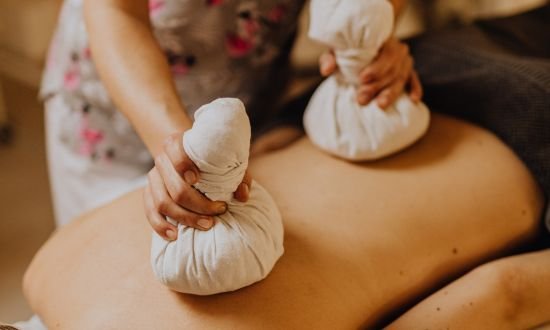
- Hot Therapy: Applying heat to the affected area can help relax tense muscles and improve blood flow. You can use a heating pad, warm compress, or take a warm bath to soothe your back. Be sure to use a barrier, like a towel, between your skin and the heat source to prevent burns.
- Cold Therapy: Cold packs or ice can reduce inflammation and numb the area, providing pain relief. Ice packing can be done to the affected area for 15-20 minutes at a time. Remember to cover ice pack in some clothing to avoid direct contact to skin for frostbite prevention.
2. Over-the-Counter (OTC) Pain Relief:
Non-prescription pain relievers like ibuprofen (Advil, Motrin) or acetaminophen (Tylenol) can be effective for managing mild to moderate pain in upper back after sleeping.
3. Gentle Exercise:
Engaging in gentle, low-impact exercises can help relieve back pain by improving circulation, flexibility, and muscle strength. It includes walking, swimming, or cycling. One should avoid high-impact activities if your back is in pain.
5. Massage Therapy:
Professional massage therapy can help relax tight muscles, improve circulation, and reduce tension in the back. A trained massage therapist can target specific areas of discomfort and provide relief.
6. Physical Therapy:
A physical therapist can create a tailored exercise and treatment plan to address your specific back pain issues. They may use techniques such as manual therapy, ultrasound, or electrical stimulation to alleviate pain and improve function.
7. Osteopathic or Chiropractic Care:
Osteopathic physicians or chiropractors can provide spinal manipulation and adjustments to realign the spine and relieve back pain. These treatments can be effective for certain types of back issues.
8. Acupuncture:
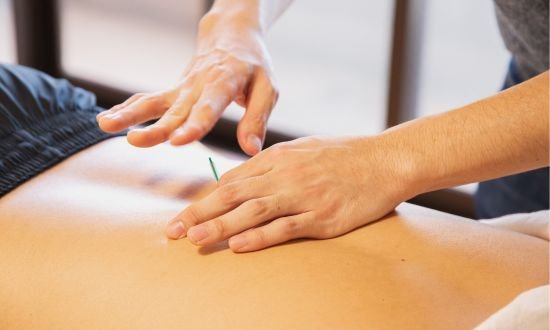
Acupuncture is a technique in which thin needles are inserted into specific points on the body to stimulate energy flow and causing pain relief. Some individuals find acupuncture helpful in managing back pain.
9. Mind-Body Techniques:
Practices like meditation, deep breathing exercises, and progressive muscle relaxation can help reduce stress and tension, which can exacerbate back pain. These techniques can promote relaxation and pain relief.
10. Ergonomic Changes:
If your pain in upper back after sleeping is related to poor ergonomics at work or home, making adjustments to your workstation or daily activities can provide relief. Ensure your chair, desk, and computer setup are ergonomically sound to reduce strain.
11. Sleep and Rest:
Allowing your body adequate time to rest and heal is essential. Ensure you’re getting enough sleep, and consider using pillows or supports to maintain a comfortable sleep posture which will help in resolving pain in upper back after sleeping.
C. Medical Treatment Of Back Pain:
Medical treatment for back pain can vary widely depending on the underlying cause and the severity of the pain. It’s important to consult with a healthcare provider to choose the best treatment plan as per your condition. Here are some common medical treatments for back pain:
1. Medications:
- Pain Relievers: Over-the-counter nonsteroidal anti-inflammatory drugs (NSAIDs) like ibuprofen (Advil, Motrin) or naproxen (Aleve) can help reduce pain and inflammation.
- Muscle Relaxants: If muscle spasms are the reason of your back pain, muscle relaxant medications may be prescribed to help ease muscle tension.
- Narcotic Pain Medications: For severe pain that doesn’t respond to other treatments, opioid medications may be prescribed. However, these medications are typically used only for a short duration due to the risk of dependence and side effects.
- Antidepressants: Some types of antidepressants, particularly tricyclic antidepressants, can be effective in treating certain types of chronic pain by altering pain perception.
- Nerve Pain Medications: Medications like gabapentin (Neurontin) or pregabalin (Lyrica) may be prescribed for nerve-related pain, such as that caused by sciatica.
2. Physiotherapy:
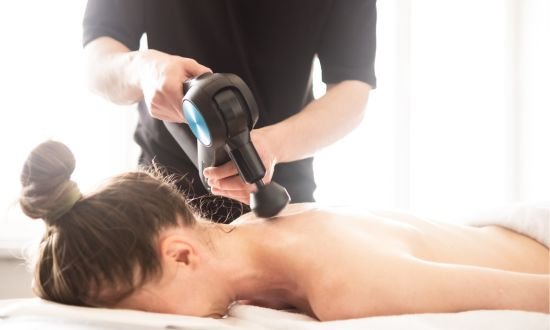
Physiotherapy is a very practical option of back pain treatment. A physiotherapist can develop a customized exercise and stretching program to improve strength, flexibility, and posture. They may also use techniques such as manual therapy, ultrasound, or electrical stimulation to alleviate pain and improve function.
3. Injections:
- Epidural Steroid Injections: In cases of severe back pain or nerve compression, an epidural steroid injection may be administered. This involves injecting a corticosteroid medication into the epidural space near the affected nerve to reduce inflammation and alleviate pain.
- Facet Joint Injections: These injections target the small joints in the spine (facet joints) that may be a source of pain. Anesthetic medication is injected into the joint to provide relief.
4. Radiofrequency Ablation:
This minimally invasive procedure uses radiofrequency energy to heat and destroy the nerves that are transmitting pain signals from the affected area of the spine. It can provide long-term relief for certain types of back pain.
5. Surgical Interventions:
In cases where conservative treatments are ineffective or when there is a structural issue that requires correction, surgical interventions may be considered. Common surgical procedures for back pain include:
- Discectomy: Removal of a herniated disc or a portion of it to relieve pressure on the spinal nerves.
- Spinal Fusion: The fusion of two or more vertebrae to stabilize the spine and reduce pain. This is typically done for conditions like spinal stenosis or severe degenerative disc disease.
- Laminectomy: Removal of the back portion of a vertebra (lamina) to relieve pressure on the spinal cord or nerves. This is often done for spinal stenosis.
- Artificial Disc Replacement: Replacing a damaged or degenerated disc with an artificial one to maintain motion in the spine.
It’s essential to work closely with a healthcare provider to determine the most appropriate medical treatment for your specific condition. Back pain can have various underlying causes, and the treatment approach should be tailored to address the root of the problem while providing relief from pain and discomfort.
When to Seek Professional Help?
Back pain is a serious issue and it should be addressed at priority. You should immediately consult a professional in following cases:
- Severe Pain with symptoms like numbness, weakness or loss of bladder or bowl control
- Pain due to Injury
- Pain is persistent for more than 2 weeks and is not settling after self-remedies
- If your pain radiates down to your legs or arms as it could be a sign of nerve compression or irritation.
- If you have back pain accompanied by a fever, chills, or signs of infection, such as redness, warmth, or swelling at the pain site.
- If you’re losing weight unintentionally and experiencing persistent back pain
- If you have a history of recurring or chronic back pain episodes
Conclusion:
Pain in upper back after sleeping is a common issue but it can be very discomforting and has a bad impact on your general health. You can enjoy restful nights and wake up feeling refreshed by addressing the root causes, practicing proper sleep hygiene, and seeking professional help. Everyone should prioritize their back health for overall well-being as a good night’s sleep is essential for a happy and healthy life.
Disclaimer:
Content on this site is written with thorough research and keeping in mind the latest guidelines. However, no content on this site should substitute professional consultation.
